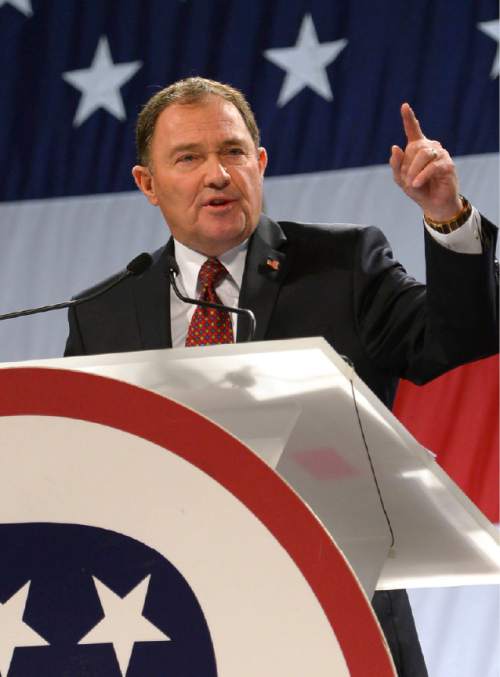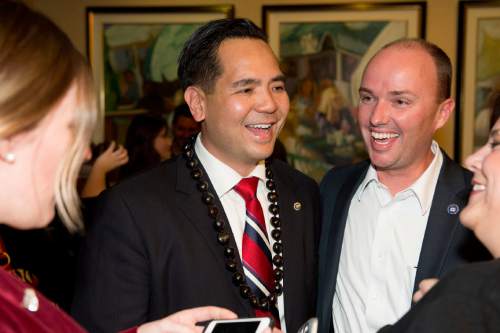This is an archived article that was published on sltrib.com in 2014, and information in the article may be outdated. It is provided only for personal research purposes and may not be reprinted.
The Utah Republican Party has filed a lawsuit against the state, alleging that changes enacted during the past legislative session to the way nominees are chosen for office violate the party's constitutional rights.
"[The change] violates the party's constitutional right to free association and infringes on its rights to free speech and due process, its ability to control its own brand and message, and its authority over its endorsement, name, and emblems," argues a lawsuit filed in federal court by the GOP over the weekend.
The party is asking a federal judge to strike down SB54, which enacted the changes.
The bill, passed in the waning days of the legislative session, represented a compromise between legislators and the group Count My Vote, which was pushing for a grass-roots initiative that would give candidates an alternative method to get the party's nomination without having to go through the current caucus-and-convention system.
Under the rules that were in place, candidates for office had to compete to be nominated by party delegates, chosen at neighborhood caucuses. If 60 percent of the delegates voted for a particular candidate at the party conventions, that candidate would be the nominee on the general-election ballot. If no candidate reached 60 percent, the two top vote-getters would go to a party primary.
Under SB54, candidates still could try to go through the convention process, but candidates also could gather a required number of signatures from registered voters eligible to vote in a party's primary, avoiding the convention.
Count My Vote organizers argued that the delegates chosen at caucuses are the most strident partisans and, as a result, picked the most ideologically extreme candidates. That alienated voters and led to recent declines in Utah's voter participation, they contended. Providing another path to the ballot, they reasoned, could help moderate Utah's politicians and improve voter turnout.
The group spent hundreds of thousands of dollars gathering signatures to put the measure on the 2014 ballot, but abandoned the bid after reaching a compromise to make the changes through SB54.
The lawsuit names Gov. Gary Herbert and Lt. Gov. Spencer Cox, both Republicans, as defendants and it will fall to Attorney General Sean Reyes, also a Republican, to defend the law.
Reyes has previously voiced his strong support for the traditional party nominating system and would presumably have to go through whatever nominating process is in place when he runs for re-election in 2016.
But Reyes' spokeswoman, Missy Larsen, said he has refrained from commenting on the nominating process since the GOP made clear it planned to sue over the nominating reforms, and he has not participated in party discussions on strategy and the potential lawsuit. He will not recuse himself from handling the case, she said.
"One of the most important ways to rebuild the trust of the people in our office is to assure them that the attorney general will defend the laws they pass, regardless of my own personal opinions," Reyes said in a statement. "Leadership is honoring your duty, even at times over your own feelings."
Utah Democratic Party Chairman Peter Corroon said his party supports the SB54 compromise and believe it amplifies the public's voice in elections.
"The intent of the United States and Utah constitutions is to allow citizens to choose their representatives, not a few delegates of one political party or another," Corroon said. "Elected officials and political parties owe it to the people of Utah to keep our promises and work in good faith, not pull a bait and switch with costly lawsuits and political theatrics."
Barring any changes, the new nominating system is scheduled to take effect for the 2016 election.
Twitter: @RobertGehrke







